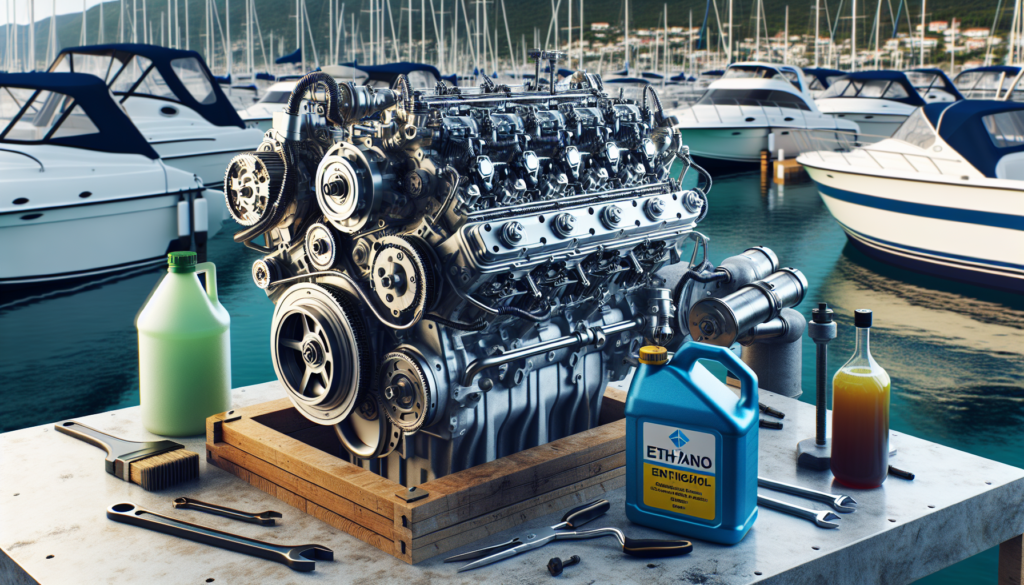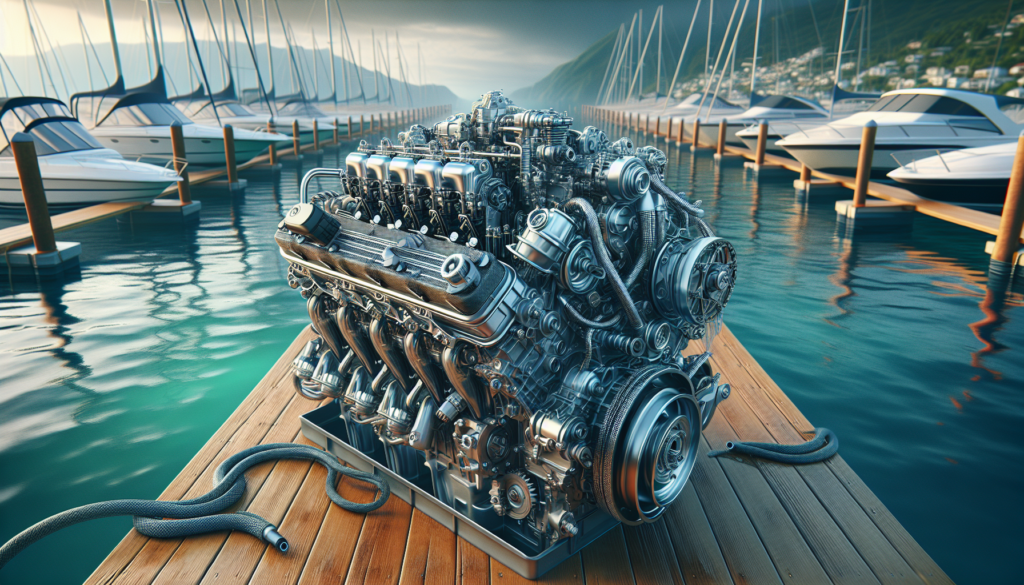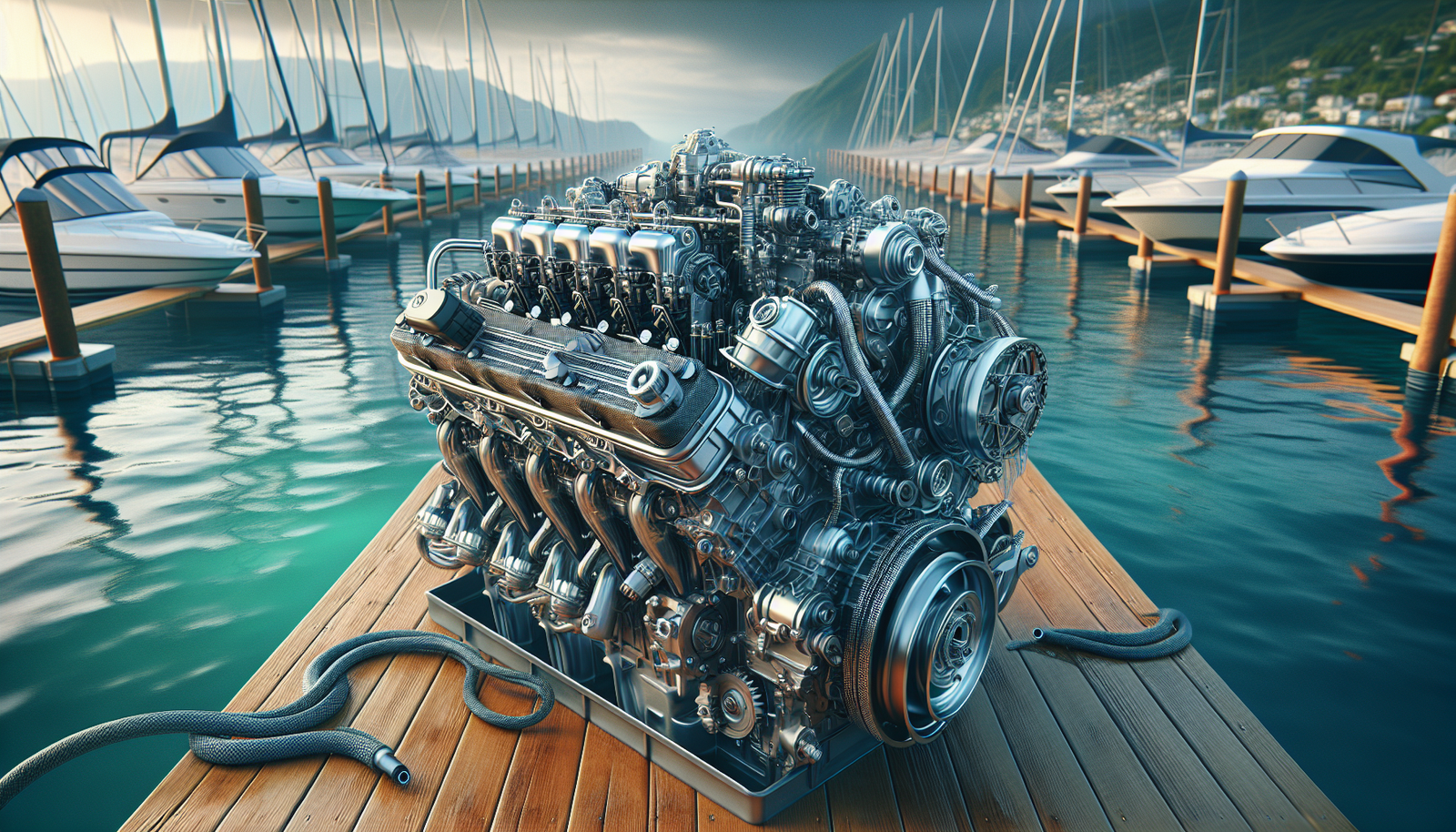Ensuring the longevity of your boat engine requires a robust understanding of how to maintain it, especially when dealing with ethanol-based fuels. This article, “Proper boat engine maintenance for Ethanol-Based Fuels,” can serve as your guide. It’s a roadmap to the preventative measures, cleaning techniques, and regular practices that can keep your engine humming smoothly across open waters, despite the challenges that these specific fuel types may present. So ratchet in hand, let’s start your journey down the path of proficient ethanol-based boat engine maintenance.

Understanding Ethanol-Based Fuels
When it comes to fuel options, you may have come across the term “ethanol-based fuels” quite often. But what exactly are these fuels and why are they becoming increasingly popular?
Definition and Composition
Ethanol-based fuels are a type of biofuel primarily made from plant matter like corn or sugar cane. These fuels contain a large percentage of ethyl alcohol or ethanol, mixed with gasoline. Ethanol serves as an oxygenate, meaning, it helps fuels to burn more completely, reducing harmful emissions.
Pros and Cons of Ethanol-Based Fuels
Ethanol fuels offer an array of benefits, one being they are renewable, sourced from plants that can be grown time and again. They also burn cleaner than traditional fuels, helping reduce greenhouse gas emissions. However, they do come with downsides. For starters, they can cause wear to vital components of your engine due to their corrosive qualities. Plus, they have less energy per gallon than regular gasoline, which can result in decreased engine performance and fuel efficiency.
Compatibility with Boat Engines
From a compatibility standpoint, many newer boats are designed to handle ethanol fuels. Still, using these fuels in older engines that weren’t designed for them can cause various issues, from damaged fuel systems to increased engine wear. Therefore, it’s crucial to know your engine specifications and use compatible fuels only.
Impact of Ethanol-Based Fuels on Boat Engines
Now that you understand what ethanol-based fuels are, it’s time to delve into their effect on boat engines.
Corrosion and Deposit Build-up
Ethanol fuels have a high alcohol content, which can attract and absorb water, leading to corrosion and rust in your engine. Additionally, they can cause deposit build-up on engine parts, affecting the overall performance of your boat.
Impact on Engine Durability
Prolonged use of ethanol fuels in non-compatible engines can significantly shorten their lifespan. The corrosion and wear caused by ethanol can result in more frequent breakdowns and costly engine repairs.
Effects on Fuel Systems
Its corrosive properties can damage the fuel system, particularly if it’s made of certain types of rubber or aluminum. Also, ethanol can cause phase separation in the fuel tank, creating a layer of water and ethanol at the bottom, leading to severe engine problems.
Choosing the Right Ethanol-Based Fuel
When it comes to ethanol fuels, not all grades are created equal. So, it’s vital to select the right one for your boat engine.
Examining Different Ethanol Fuel Grades
Ethanol fuels come in various grades, which denote the percentage of ethanol mixed in. The two most common types you’ll find are E10 (up to 10% ethanol) and E85 (up to 85% ethanol). While E10 is fairly small in its ethanol composition, it’s generally safe for most engines. On the other hand, E85 should only be used in engines specifically designed for it.
Matching Fuel Grade to Boat Engine Specifications
To ensure optimal engine performance and longevity, always match the fuel grade to your boat engine specifications. Check the owner’s manual to know what type of ethanol fuel your engine is designed to run on.
Identifying Quality Ethanol-Based Fuels
Quality ethanol fuels should be clean, involve less water contamination, and have a consistent ethanol-gasoline ratio. Regular fuel testing can help identify the quality and verify that the fuel is suitable for use in your engine.

Preventing Ethanol-Related Engine Problems
While the use of ethanol fuels can bring about certain issues, several precautions can prevent them.
Fuel Stabilization
Before storing your boat for a lengthy period, it’s important to stabilize the fuel to prevent degradation and the formation of corrosion-causing acids. Fuel stabilizers react with the fuel to form a protectant layer, effectively minimizing the risk of corrosion and deposit build-up.
Proper Fuel Storage
Ethanol fuels should be stored carefully as they’re susceptible to attracting moisture from the air. Store fuel in an airtight, approved container and keep it in a cool and dry area. Try to use it up within a few weeks of purchase.
Regular Fuel System Checks
Periodic checking of the fuel system can help detect ethanol-related damage. Look out for signs of leaking, corrosion, or clogging in the fuel lines, pump, and filter.
Ethanol-Compatible Engine Components
If you’re using ethanol fuels, it’s crucial to equip your boat with ethanol-compatible components.
Fuel Tanks and Fuel Lines
Choosing ethanol-compatible fuel tanks and lines can help minimize the risk of corrosion and leakage. This generally includes using parts made from stainless steel or certain types of plastic.
Carburetors and Injectors
Similarly, the use of ethanol-resistant carburetors and injectors can prevent clogging and keep the fuel flowing smoothly.
Fuel Filters
High-quality fuel filters can capture any residue before it reaches the engine, thereby protecting the engine from potential damage and enhancing its performance.
Regular Engine Maintenance Routines
Regular upkeep of your boat engine is key to its smooth operation and longevity, especially when ethanol fuels are involved.
Routine Engine Inspections
Regular engine inspections will enable you to spot corrosions, leaks, or other potential problems, allowing you to address them promptly before they escalate.
Scheduled Parts Replacement
Certain parts like the fuel filter or spark plugs may need to be replaced more frequently when using ethanol fuels. Stick to your parts replacement schedule to keep your engine performing at its best.
Timely Repairs and Upgrades
Procrastinating on necessary repairs or upgrades can lead to costlier problems in the future. Whether it’s fixing a leak or upgrading to ethanol-resistant components, don’t delay these tasks.
Cleaning and Flushing the Engine
Keeping your engine clean is also part of a proper maintenance routine.
Importance of Regular Cleaning and Flushing
Regular cleaning and flushing helps to remove any deposits or residues, improving engine efficiency and longevity. With consistent cleaning, you can mitigate the potential damage caused by ethanol fuels.
Proper Cleaning Techniques and Solutions
Ensure to use proper cleaning techniques and solutions suitable for your boat engine. For instance, use ethanol-compatible fuel system cleaners for removing deposits in the fuel system. Additionally, follow a proper flushing process after running your boat to eliminate leftover fuel in the system.
Frequency of Cleaning and Flushing
The frequency of engine cleaning and flushing depends on several factors like the engine’s usage, the quality of the fuel, and your typical boating environment. However, a good rule of thumb is to do it after every use or at least once every boating season.
Winterizing Your Boat Engine
Winterizing is an essential part of maintaining your boat engine, particularly when using ethanol-based fuel.
What is Winterizing?
Winterizing is the process of preparing your boat for winter storage. It typically involves draining and flushing the fuel system, adding fuel stabilizer, and protecting the engine parts from rust and corrosion.
Why Winterize an Engine Using Ethanol-Based Fuel
For engines using ethanol fuels, winterizing is vital to prevent fuel degradation and phase separation in the fuel tank. Moreover, it helps protect your engine against corrosion, ensuring its readiness for the next boating season.
Steps to Winterize Your Boat Engine
The winterizing process involves a range of steps from thoroughly cleaning and drying the engine to changing the oil and applying anti-corrosion spray. Remember to consult your engine manual for specific instructions relevant to your engine model.
Improving Fuel Efficiency
There are several ways to improve your boat’s fuel efficiency, even when using ethanol fuels.
Tuning Your Boat Engine
Properly tuning your boat engine can do wonders for its fuel efficiency. From properly adjusting the carburetor to changing spark plugs on schedule, every little bit helps to ensure the engine is running at peak performance.
Lightening the Load
Carrying less weight on your boat can increase its fuel efficiency. So, take stock of what’s on board and get rid of anything unnecessary.
Using High-Efficiency Propellers
Using high-efficiency propellers can also help. These propellers have been designed to offer optimal thrust with minimal rotations, reducing your boat’s fuel consumption.
Professional Assistance and Services
While you can do a lot of the maintenance work yourself, there are times when professional help might be necessary.
When to Seek Professional Help
If you’re unsure about any aspect of your engine maintenance or if you spot any unusual signs, it’s best to seek the help of professionals. Also, when serious repairs or upgrades are needed, professional services are usually the safest bet.
Choosing a Reliable Service Provider
Make sure to choose a reliable service provider who is knowledgeable about ethanol fuel and its impact on engines. Look for good customer reviews and reliable certification before making your choice.
Benefits of Regular Professional Maintenance
Professional maintenance services can ensure your boat engine is in top shape and performing at its best. Regular professional checks can identify potential problems early and prevent bigger issues down the line.
To conclude, using ethanol-based fuels in your boat engine can have its advantages and downsides. However, with a good understanding of these fuels and proper engine care, you can enjoy all the benefits they offer without compromising your engine’s performance or longevity.

